#Edward “the Martyr” is assassinated
Explore tagged Tumblr posts
Text



On May 29th 1546 Cardinal Beaton, Lord High Chancellor of Scotland, was murdered.
On the morning of that day when the gates of St. Andrews opened, ten or twelve men entered with the throng of workmen, these were no ordinary men, they had murder in mind, and revenge for the death of their friend the Protestant martyr, George Wishart, who had been executed on the orders of Beaton two months before.
Leading the first group was the noble, Kircaldy of Grange. While Kircaldy diverted the attention of the porter, another man, Norman Leslie led in a second contingent.
Finally, another Fife noble, John Leslie arrived with four men. Something about them alarmed the porter. He tried to raise the drawbridge, but the conspirators snatched away his keys and threw him into the moat.
Thinking that an army must be close behind, the repairmen fled. The conspirators then hustled fifty other people out of the castle. Cardinal Beaton stuck his head out a window and asked what the commotion was about. Someone shouted that Norman Leslie had taken his castle. This frightened the cardinal. The two had recently fallen out. But many others had reason to dislike the cardinal. His enemies said he had forged a will for the late King James, overthrown Scottish liberties, and tortured and murdered Protestants.
When Leslie ordered the cardinal to open his door, Beaton refused. But when the assassins prepared to burn him out, Beaton pleaded for a promise that they not kill him and when it was given, opened the door. Sitting in a chair, he protested, “I am a priest, I am a priest; you will not slay me.”
John Leslie struck him twice with his dagger, followed by Peter Carmichael. James Melville, seeing that they were acting in fury, reminded them that the judgment of God should be dealt out soberly. Rebuking Beaton for his wicked life and especially for the murder of Wishart, he ran him through twice with a sword. Beaton died saying again, “Fie, fie, I am a priest, all is lost.”
John Knox joined the murderers soon afterward, seeking protection. He was a hunted man, known as a close associate of George Wishart. The murderers urged him to become their chaplain and he agreed. The men took refuge in the cardinal’s stronghold. They were besieged in the Castle by the governor of Scotland, Regent Arran. On 11 March 1547 Norman and his colleagues, Henry Balnaves, James Kirkcaldy of Grange, and Alexander Whitelaw of Newgrange witnessed a pledge made by Patrick Gray, 4th Lord Gray to Edward VI.
The lairds in the castle, sometimes called the Castilians, were summoned to answer for the murder, and, failing to do so, were on 30 July 1547 denounced as rebels. On the same day the castle was surrendered to the French, and a condition having been made that the lives of all within it should be spared, its principal defenders were carried captives to France.
7 notes
·
View notes
Photo
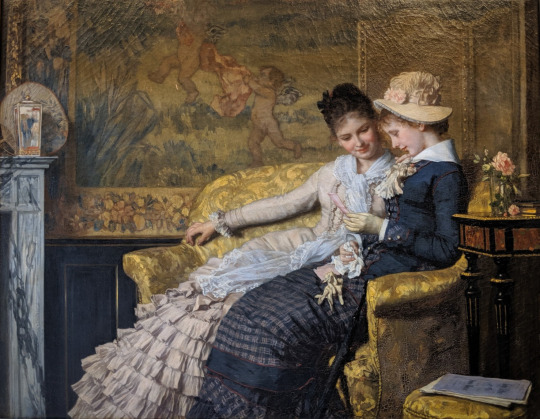
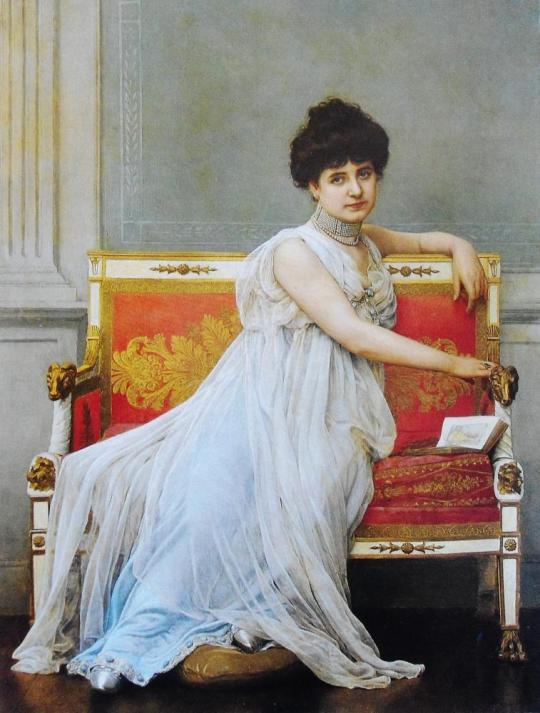
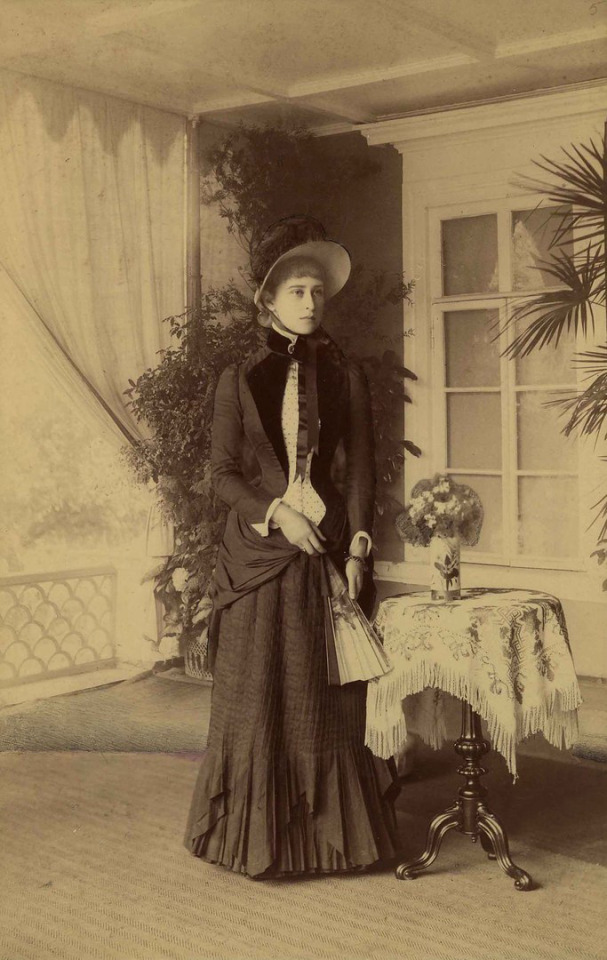
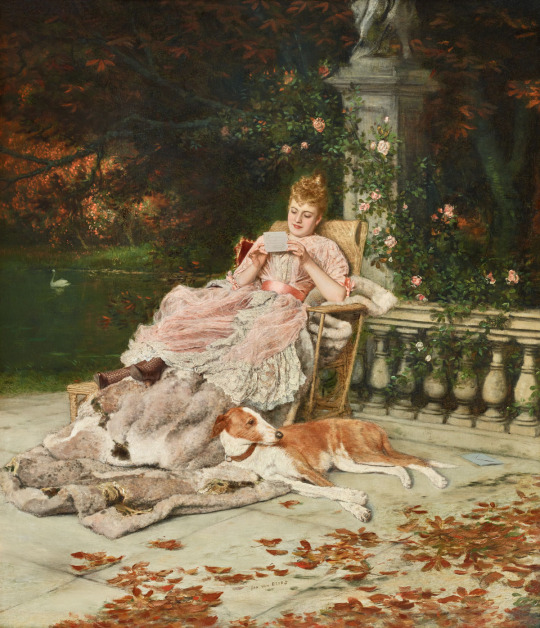
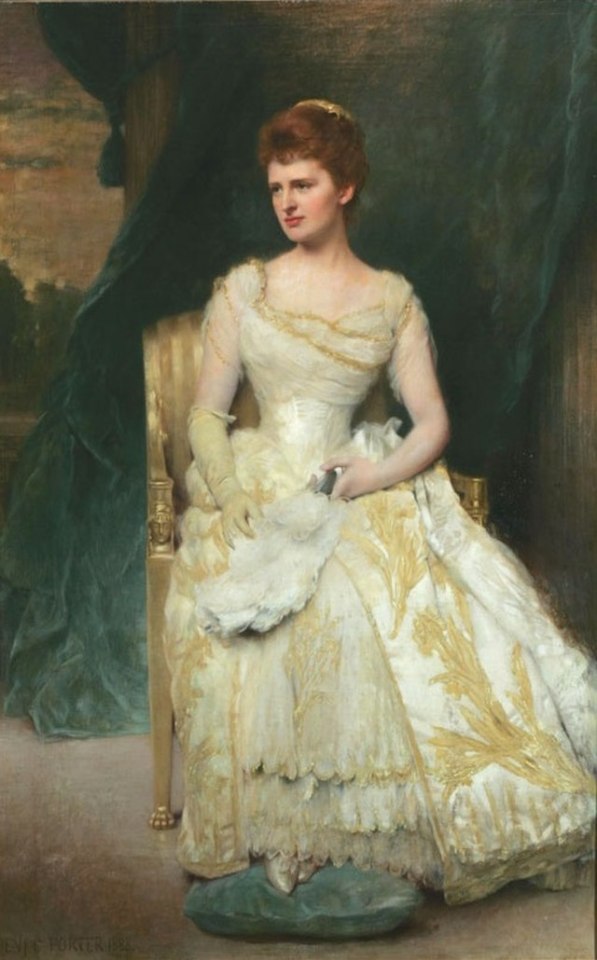

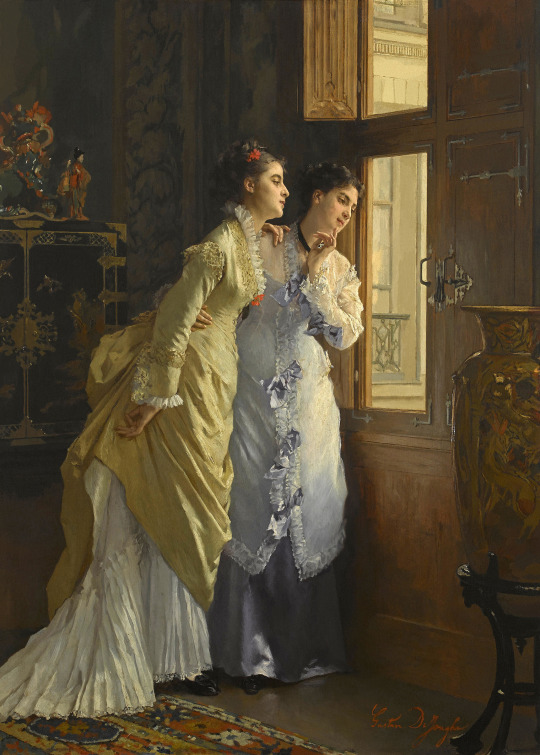
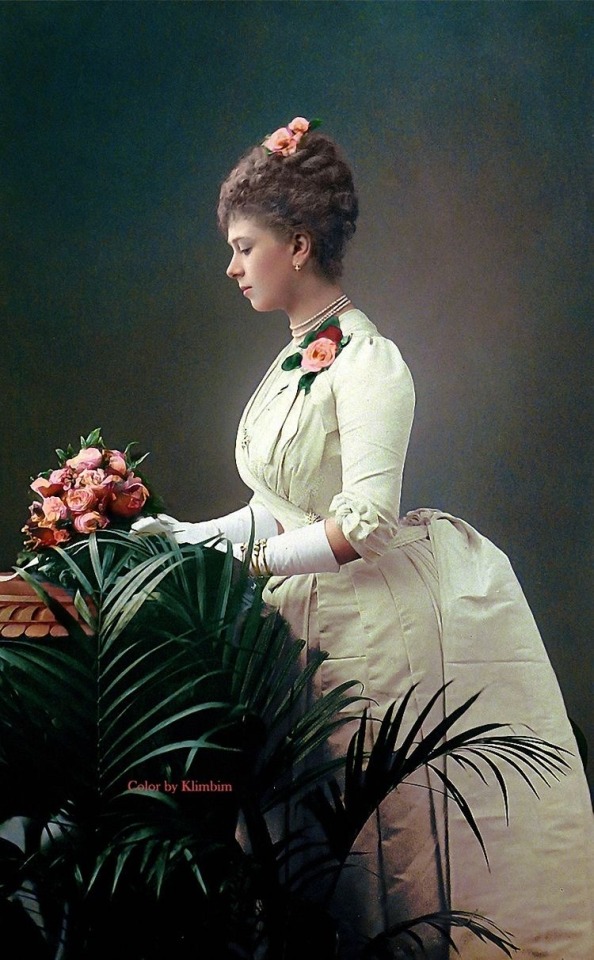
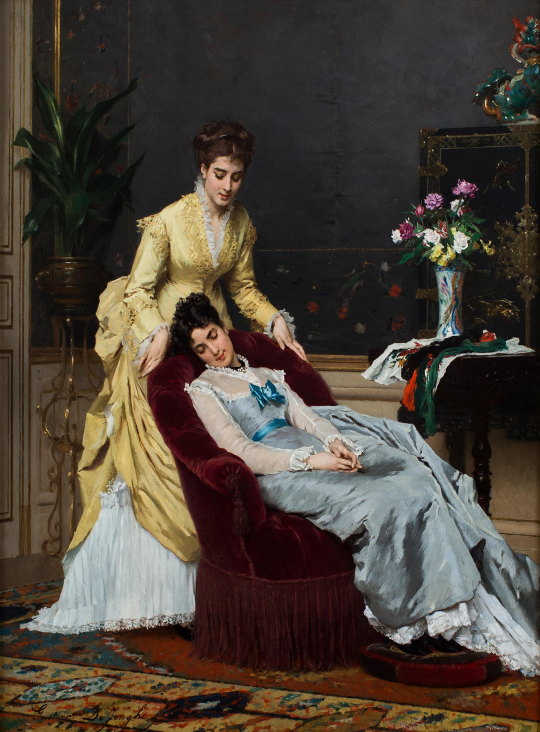
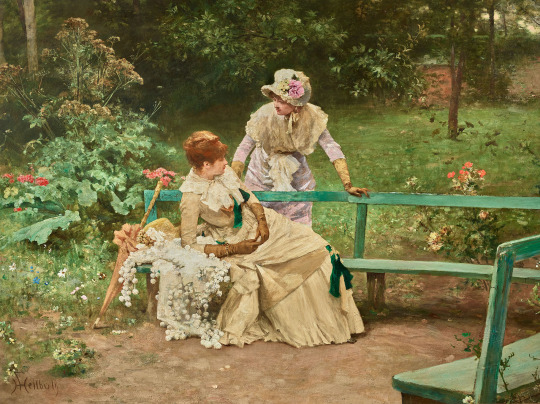
The 1880s -
Top 1880 La lettre d'amour by Joseph Scheurenberg (location ?). From tumblr.com/artthatgivesmefeelings 1477X1146. Fixing the wrinkles would do more to the image than leaving the wrinkles intact.
Second row left 1880 Noble Woman by Jan van Beers (location ?). From tumblr.com/toanunnery 757X1000 @72 183kj. Interesting Napoléonic-looking dress.
Second row right 1880s Grand Duchess Elizabeth Feodorovna of Russia. From tumblr.com/royaland; fixed spots w Pshop 683X1080. She was one of the beauties of her time. She was assassinated by the Bolsheviks and immortalized on the martyrs entrance to Westminster Abbey along with other heroic religious figures such as Oscar Romero and Martin Luther King Jr.
Third row 1883 (exhibited) Le billet doux by Jan-Van-Beers (on sale at Ary Jan Art Gallery). From their Web site; fixed most obvious spots & left side of upper edge 1200X1395.
Fourth row left 1888 Emily Thorn Vanderbilt Sloane (Vanderbilt University Fine Arts Gallery - Nashville, Tennessee, USA). From Google search 640X1030.
Fourth row right 1889 Elegant lady, seated three-quarter length, before a Lakeland landscape by Edward Hughes (auctioned). From mutualart.com/Artwork/Portrait-of-an-Elegant-Lady-Seated-Three/B11E6296D1FCE9A6 1834X2634.
Fifth row Awaiting the suitor by Gustave Léonard de Jonghe (location ?). From Yulia Mi's photostream on flickr; fixed spots & some cracks w Pshop 2060X2880.
Sixth row left Mary, Duchess of York, future Queen Consort of King George V, color by Klimbims. From tumblr.com/royaland 750X1213. This is the Lady honored by the large metal monument in Long Beach harbor in California.
Sixth row right Sweet dreams by Gustave Leonard de Jonghe (location ?). From Yulia Mi's photostream on flickr 1510X2048.
Seventh row The confidence by Ferdinand Heilbuth (on sale at Ary Jean Art Gallery). From their Web site; fixed biggest spots wPshop 1961X1467. The left side of the upper edge also needed fixing.
20 notes
·
View notes
Text
Events 9.20 (before 1960)
1058 – Agnes of Poitou and Andrew I of Hungary meet to negotiate about the border territory of Burgenland. 1066 – At the Battle of Fulford, Harald Hardrada defeats earls Morcar and Edwin. 1187 – Saladin begins the Siege of Jerusalem. 1260 – The Great Prussian Uprising among the old Prussians begins against the Teutonic Knights. 1378 – Cardinal Robert of Geneva is elected as Pope Clement VII, beginning the Papal schism. 1498 – The Nankai tsunami washes away the building housing the Great Buddha at Kōtoku-in; it has been located outside ever since. 1519 – Ferdinand Magellan sets sail from Sanlúcar de Barrameda with about 270 men on his expedition which ultimately culminates in the first circumnavigation of the globe. 1586 – A number of conspirators in the Babington Plot are hanged, drawn and quartered. 1602 – The Spanish-held Dutch town of Grave capitulates to a besieging Dutch and English army under the command of Maurice of Orange. 1697 – The Treaty of Ryswick is signed by France, England, Spain, the Holy Roman Empire and the Dutch Republic, ending the Nine Years' War. 1737 – The Walking Purchase concludes, which forces the cession of 1.2 million acres (4,900 km2) of Lenape-Delaware tribal land to the Pennsylvania Colony. 1792 – French troops stop an allied invasion of France at the Battle of Valmy. 1835 – The decade-long Ragamuffin War starts when rebels capture Porto Alegre in Brazil. 1854 – Crimean War: British and French troops defeat Russians at the Battle of Alma. 1857 – The Indian Rebellion of 1857 ends with the recapture of Delhi by troops loyal to the East India Company. 1860 – The future King Edward VII of the United Kingdom begins the first visit to North America by a Prince of Wales. 1863 – American Civil War: The Battle of Chickamauga, in northwestern Georgia, ends in a Confederate victory. 1870 – The Bersaglieri corps enter Rome through the Porta Pia, and complete the unification of Italy. 1871 – Bishop John Coleridge Patteson, first bishop of Melanesia, is martyred on Nukapu, now in the Solomon Islands. 1881 – U.S. President Chester A. Arthur is sworn in upon the death of James A. Garfield the previous day. 1893 – Charles Duryea and his brother road-test the first American-made gasoline-powered automobile. 1911 – The White Star Line's RMS Olympic collides with the British warship HMS Hawke. 1920 – Irish War of Independence: British police known as "Black and Tans" burn the town of Balbriggan and kill two local men in revenge for an IRA assassination. 1941 – The Holocaust in Lithuania: Lithuanian Nazis and local police begin a mass execution of 403 Jews in Nemenčinė. 1946 – The first Cannes Film Festival is held, having been delayed for seven years due to World War II. 1946 – Six days after a referendum, King Christian X of Denmark annuls the declaration of independence of the Faroe Islands. 1955 – The Treaty on Relations between the USSR and the GDR is signed.
0 notes
Text
18th March
St Edward the Martyr’s Day

Edward the Martyr. Source: Alamy Stock Photos
On this day in 979, the descriptively named Edward the Martyr was murdered. Edward was king of the relatively recently united England, but his legitimacy to succeed his father King Edgar was not uncontested. On the day of his death, Edward was enjoying a boar hunt and stopped at the manor of his step mother, Dowager Queen AElfthryth at Corfe Gate on the Isle of Purbeck in Dorset, who greeted him and offered the young man a refreshing cup of wine. As the king drank however, a hired assassin crept up behind him and stabbed him - literally - in the back. On feeling the blow, the surprised king instinctively spurred his horse forward to escape the attack, but the assassin had done his work. Edward tumbled dying from the horse and was dragged along the ground by a single stirrup as his steed bolted. His body was never found. AElfthryth however issued the story that Edward had been killed in a riding accident and ensured her son, Aethelred assumed the throne.
This Shakespearean story of murder most foul was not over however. The road between Corfe and Wareham in succeeding years became a place of miracles on which blind men found they could see, cripples were able to walk, and the deaf found they could hear. These phenomena were attributed to Edward and so gravediggers were sent to investigate. Edward’s body was found in a shallow roadside grave, in pristine condition and his tell-tale wound clearly visible. The former king was duly canonised and declared a martyr and his relics became a centre of pilgrimage in Shaftesbury. Although no charges were ever brought against AElfthryth, public opinion had no doubt, and the dowager queen ended her days in repentance as a nun at Wherwell in Hampshire. As for her son, he did not enjoy a happy reign - he was corrupt and weak and would be besieged by Viking invaders. He became known to history as Aethelred the Unready.
1 note
·
View note
Text
Hunter lead the path down the stairs as they followed the floating purple necklace. He kept his knife in front of him, having it trail the object. This felt like too much of a trap. Having to fight against this magic just hours prior, it couldn't be anything but a trap. And they didn't have the reinforcements like they did during the last battle.
When the reached the back into the hidden room, Hunter's eyes scanned around. He was looking for any trap that may be waiting for them. Any hiding place that may be used for an ambush. He didn't see anything but that didn't mean much when it came to magic as he learned. Still it seemed that the only magic being used was to remove obstacles in their way.
"Josephine be careful." He uttered as she moved to another hidden door.
What was reviled to them was something far worse then either of them can imagine. Hunter's eyes traced the string that connected pictures and documents. All of it coming to the conclusion spoked by Edith. The emperor's family was in danger. Things just went bad to worse. They would have to do something now armed with this knowledge. If needed, Hunter could assassinate the coup's leader. It wouldn't take him much to get through any guards that were around the leader nor would it be particularly hard for him to kill the leader. But a brazen attack such as that might make the coup leader a martyr and as such strengthen the legitimacy of this coup. This would need more tact then the ex-spartan could provide on his own.
"It would be the perfect time to strike. Everyone would be busy or preoccupied with the wedding that defenses would be down."
When the two appeared to the couple, Hunter had put his combat knife back into its sheath. The threat was over and the blade unneeded for now. He listened as Josephine and Edith talked to him soon being addressed by Josephine's grandfather.
"Of course sir, I will do everything I can for her."
The comment about naming their firstborn Edward seemed out of left field to Hunter. They were barely married. He wasn't even thinking about having children just yet. It would have to be discussed with Josephine before any of that became serious. When they left, Hunter turned to his beloved and asked a question.
"Is Edward an important name in your family?"
Hunter stayed by Josephine's side as she continued to grieve. His hand began to rub her back as it was a way of comfort he learned when taking care of Rebecca. It seemed like his efforts were working a little bit so he continued to just be next to his wife. He stayed silent for a few more moments before she spoke up.
"Some rest might do us some good. I'll help you up to the bed room."
He would pick Josephine up, bridal style, and carry her up to the bed room. While she was changing into her night gown, he would also remove his knight armor and bathe before slipping into his night clothes and then crawl into bed next to Josephine.
"Yes we will but it won't be something that has to be done right now. We can work at it in small bits as a time. You don't need to overwhelm yourself."
His arm lifted up over her as she came closer. When she was all settled in, he lowered his arm around her with his hand resting against her arm. With his genetic augmentations, he never really needed much sleep. It was more like a light rest that he could awaken from at a moments notice. When the purple light began to glow, he was immediately removed from his slumber. It would seem that his wife was up as well.
"Another attack?" He asked while grabbing his combat knife that he kept close by.
Soon came a voice that Hunter was very unfamiliar with but it seemed that Josephine knew exactly who it was. When she got up to follow the light, Hunter did as well but kept the combat knife from the UNSC close with him. He was becoming very unfond of magic.
20 notes
·
View notes
Text
Today in Christian History

Today is Friday, March 18th, the 77th day of 2022. There are 288 days left in the year.
Today’s Highlight in History:
386: Death of Cyril, Bishop of Jerusalem, notable for lectures and writings that influenced the development of Lent and Passion Week observances throughout the entire church.
978: In Saxon England, youthful Edward “the Martyr” is assassinated at the instigation of Queen Elfrida who wants to place his half-brother Ethelred on the throne. Although this is a political assassination, Edward’s piety and defense of the church has been such that the priests and common people consider him a martyr. Rome will include him in its roll of those who died for the faith.
1314: Philip the Fair of France burns thirty-nine Knights Templars at the stake in Paris on charges which appear trumped up. He wishes to seize their wealth.
1582: In Antwerp, Juan de Jáuregui attempts to assassinate William of Orange, the Protestant leader of the Netherlands.
1728: Death at Lewisham of George Stanhope, a moderate leader in church politics and one of the commissioners that oversaw the building of fifty churches in London after the great fire.
1813: Abdul Masih [a.k.a. Shekh Salih], a convert from Islam to Christianity, arrives in Agra, where he works wholeheartedly as an evangelist and educator. When he preaches out of doors, Muslims will crowd the rooftops to hear him.
1830: Death at Goruckpore of Seeta-Ram, who, despite ill health, and all that it cost him in social ostracism, had shared the gospel publicly and privately for about twelve years with his Hindu compatriots.
1968: Death in Pasadena, California, of Charles Edward Fuller, founder of Fuller Theological Seminary and well-known as the voice of the radio program The Old Fashioned Revival Hour.
1980: Muslim students at the University of Alexandria threaten Mr. Edmonds, a Christian student, demanding he denounce his faith or die. When he refuses, they beat him unconscious and leave him with a broken arm.
1983: Death of Catherine Marshall in Boynton Beach, Florida. She was a Christian writer of talent and influence, author of A Man Called Peter, the biography of her first husband, Peter Marshall.
#Today in Christian History#March 18#death of Seeta-Ram#Edward “the Martyr” is assassinated#death of Charles Edward Fuller#Death of Cyril (Bishop of Jerusalem)#Philip the Fair of France burns thirty-nine Knights Templars
3 notes
·
View notes
Text
Ok so after reading all the books and while reading Midnight Sun, there’s one thing I’m 100% sure about : Bella and Edward will never be able to have a healthy romantic relationship with anyone.
No one has ever shown Bella unconditional love. Charlie loves her as much as the Cullens but he doesn’t show it. Renee... Well, would Renee love Bella if she wasn’t this responsible, calm and wise mini-adult ? No. I’m sure she loves her daughter, but it’s not unconditional and Bella knows it. She wanted to please her sole parent and had to grow up really fast. She doesn’t have any friend and spent all her free time with a mom that needed her daughter to run her own house. Renee would probably not show her daughter how important she is to her if she hadn’t fitted her life so easily. Bella was the perfect child that never needed care, like Renesmee. With the Cullens, it’s different. They love her because she makes Edward happy, they protect each other no matter the cost, no family member has to be useful to be loved. And she changed Edward’s life just by existing, that’s all she had to do.
Bella could have had a healthy relationship with Jake (pre-character assassination) but she rejected it. Jake didn’t give her enough. She couldn’t “turn” like him and abandon her past self to be a part of a family, she would never totally be a part of the pack. Normal is not enough for her. She wants full access or nothing.
Edward just hates himself and seems to just want other reasons to hate himself lol. He hates himself because Carlisle turned him, so he hates Carlisle, then becomes a murderer and then hates himself but changed his mind about Carlisle. With Bella he can play martyr and hate himself even more because he puts her in danger for his ~selfish desire to be with her. Like, the guy will never NOT hate himself, he probably hated himself when he was alive. This self deprecation will never leave him totally because this is the way it is with vampires, their character is frozen and barely changes.
A healthy relationship with someone who tries to help him overcome this self-hate ? Nah. Sorry Tanya, you’re too good for me. I need someone I can save from myself. I need a partner that makes me feel human because it makes me feel like I can escape my condition and be reminded that it’s actually impossible the minute I’m not with her. I need to be punished and love can’t be 100% pleasure because I don’t deserve it, yadda yadda...
Bella and Edward both seek opposite, unhealthy things. They would NEVER be in a healthy relationship, their past set them for failure on this side. So yes, their relationship is unhealthy but neither of them can have a healthy one, so...
#it's 2 am lol#really midnight sun is doing things to my brain#why am i eve nthinking bout thi like really#i wasnt even a fan in 2008 lmao the twilight renaissance is really a drug#twilight renaissance#twilight renewal#midnight sun#edward cullen#bella swan#the cullens#their relationship has positive sides tho#i'm only talking about the negative ones#tbh i never really understood all the hype with the twilight renaissance but like#i totally get it after reading the books#the potential#ALL THE POTENTIAL#like idk i've never thought about harry potter or got this way because everything makes sense#but with twilight there's s much to say lol#smeyer dared to create something crazy and ~problematic and it's soooo interesting#like literally it's awful but it's so good to invest time and thoughts in that#especially collectively
16 notes
·
View notes
Photo

(Main image: Hypatia Teaching at Alexandria by Robert Terwick Brown)
Born between 350–370, Hypatia a Hellenistic Neoplatonist philosopher, astronomer, and mathematician, who lived in Alexandria, Egypt, then part of the Eastern Roman Empire. Daughter of Theon of Alexandra (himself considered to by many to be the greatest mathetician of his generation), Hypatia would go on to succeed him as leading mathematician in Alexandria before becoming one of the highest regarded mathematicians in the Eastern Roman Empire.
Her philosophy of Neoplatoism led her to to choose a life dedicated to the service of knowledge and learning, with mathematics in particular being key to a life of highter contemplation.
Her intelligence and wisdom made her extremely highly regarded in her time, with her even coming to have influence in political circles, particularly with Orestes, the Roman prefect of Alexandria. This, unfortunately, ended up contributing to her death as it drew her into the violent feud that was brewing between Orestes and the archbishop of Alexandria, Cyril.
Despite Hypatia reportedly being willing to teach anyone who was willing to learn in the Neoplatonic school in Alexandria where she taught philosophy and astronomy, regardless of whether they were a pagan like herself or any of the myriad religions that existed in Egypt at the time, the fact that she was not just a pagan, but a pagan with both heretical views AND supposed influence on a key political figure led some Christians to accuse her of either causing or prolonging the feud between Orestes and Cyril.
So, in 415, a Christian mob, led by a lecter called Peter, murdered her in the street, in a crime of such violence that it caused shockwaves across the Empire. At the time philosophers were seen as being politically untouchable, and the fact that a mob was able to kill one in the street, and a woman at that, was seen as “profoundly dangerous and destablising“.
Now while an investigation into the death of Hypatia found that Cyril probably didn’t order her assassination, per se, it is accepted by some historians such as Edward J. Watts, that Cyril’s smear campaign against her did contribute towards a Certain Folk feeling that she was an acceptable target for violence.
Now, with that in mind, here’s where it gets... more gross.
Due to Hypatia reportedly being a lifelong virgin (there are multiple historical accounts of her firmly putting down advances by men attempting to get with her, which has led to some modern historians speculating that she was somewhere on the LGBTQ spectrum, but we lack the information to say one way or the other) and due to her death mirroring that of several Christian martyrs, many people think that she was used as the basis for the story of Saint Catherine of Alexandria.

Saint Catherine, who reportedly lived a 100 years after Hypatia, was the daughter of a noble and a scholar, who had all of Hypatia’s good qualities (smart, charismatic, kind etc) but had converted to Christianity at the age fo 14, and was subsequently martyred at 18 after a mob of pagans killed her in the street.
Now, unlike Hypatia there is no historical basis for a 4th century saint called Catherine who lived and died in the matter described, with the first mentions of her even existing until the 9th and 10th centuries, leading some to speculate that she’s a metaphor or an allegory...
Or a bunch of medieval monks took the story of Hypatia, a good woman who died as a result of Christian religious violence, and rebranded her with a different name, turned Hypatia’s lectures on science and philosophy into Catherine converting pagans to Christianity, and inverted the identities of the victim and murderer to apply to their own agenda.
And the thing which makes it more nuts, is Saint Catherine was reportedly one of the figures that allegedly appeared before Joan of Arc that convinced her to go to the king of France to help him fight the English, which in turn led to Joan’s own execution and eventual sainthood.

14 notes
·
View notes
Note
Hej! I have seen that you make a lot of theories about Hitman and I love it! Im always into theorising about the characters, who they are, characterisations etc. So I wanted to ask you, what do you think are the four main char tees for people? How would you describe 47, Diana, Grey and Olivia as characters? What are they doing in their life? Do you have any guesses about that? I would be interested in to hear!
Heya anon! Yes, I’m super into analyzing the HITMAN franchise and its characters. I think it’s so fascinating to pick apart their motives, and how they carry out their agendas. Really, I just love plotting them on an alignment chart. Here’s what I’ve got for all four of them, but be warned, it’s a doozy!
Olivia Hall
In order to understand who Olivia is as a character, you need to understand her backstory. Olivia was essentially adopted by Grey when she was 7. Grey was working as a mercenary in Sierra Leone, and met Olivia as a child=soldier. Grey, in pity and rage at her situation, took her away, and got her a good education. They’ve been together through thick and thin.
What you need to get from this is that from a very young age, Olivia has been exposed to violence. She understands that using force is a surefire way to get what you want. She also has a bone to pick with the privileged organizations in the world who force innocents to fight their wars for them. Like Grey, she has noble intentions, and is willing to do terrible things because the ends justify the means.She’s more realistic than Grey, in that she doesn’t believe in “hearts and flowers crap” (as evidenced by her dialogue in the “Homecoming” cinematic) and doesn’t like to take chances of having hopeful things.
In the future, I can see Olivia carrying on the fight against greedy and corrupt organizations in the world. After Grey either dies, decides to settle down with his brother, or just chooses to retire from the whole mercenary thing, Olivia will probably continue to take down people like Providence with her hacking skills. After all, she’s young, he’s not. She’s Grey’s successor, in a way. The song “Ruckus” by Konata Small really just explains her entire character.
Diana Burnwood
Man, is Diana one tough woman! Like Olivia, Diana fights for what’s right, and she’s not afraid to go rogue or disobey her superiors to carry out her own agenda. However, in contrast to Grey and Olivia, she has standards, and adheres to her own moral code no matter what. Unfortunately, as I covered in this post, she works for an organization that prides itself on being amoral, and while she herself may not be, she’s still complying with the exact kind of people Olivia and Grey despise.
We also have to talk about her relationship with 47. I think that in addition to being a good friend, Diana’s also a mentor for 47 in finding his humanity, as the devs had said themselves, she’s his conscience. She acknowledges and supports 47’s determination to take down the Partners, but she also wants him to do so in a way that won’t reduce him to an anarchist. 47 is a blank slate here, and she doesn’t want him to become a spite-filled abuser-of-force like Grey. She’s the mom-friend. However, I also think she’d recognize that some people deserve what’s coming. If Grey doesn’t change his tune, I don’t think she’ll be going out of her way to save him, unless, of course, she sees that 47 wants to see his brother alive.
I feel like Diana’s at a crossroads here. She can either remain loyal to the ICA, and remain on the side of the oppressor, or, she can go full rogue like Grey for their cause. Honestly, I don’t think her story will end with her doing either. We’ve seen Diana go rogue to pull off elaborate schemes to reform the ICA before, I don’t see why she couldn’t do it . . . again. (Seriously, did IO have to completely copy the story from Blood Money to Absolution for WoA?) She’s not going to let the ICA keep abusing their amoral privilege, but she also doesn’t want to stoop to the levels of Grey and start using violence to achieve her means. If she doesn’t get shot dead in HITMAN 3, I would love to see her become Head of the Board of the ICA.
Lucas Grey
I guess the great thing about already having milked this man’s character dry is that I know exactly what to write here! Simply put, Lucas Grey is blinded by revenge and is stooping down to the level of his oppressors in an attempt to free himself. Even though he's the clone that escaped the facility, Lucas Grey is the most trapped person in the Hitman series. He's lived his entire life filled with spite and hatred against those who have wronged him, and his desire to see them destroyed has completely consumed him. He think that destroying Providence and, mercilessly manipulating, killing and stepping over those who stand in his way is noble and vigilant. He believes that doing this will bring him closure and satisfaction, but in reality, he's only stooping down to his oppressors' level and becoming the very thing he sought out to destroy. He might not be operating on behalf of Province, but he has hurt countless people, deserving of punishment or not, in pursuit of his own goals, and this, in and of itself, makes him just as bad as Edwards and the Partners.
What he fails to realize is that it's not enacting revenge against the world that will make him satisfied, it's separating his identity from what Providence wanted him to be, and freeing himself from the cage that he's placed himself in. He's similar to Beneatha Younger from A Raisin in the Sun, in terms of how they play into the will of others. He insists that he's a free man, but he constantly asserts that he's defined by the cruel world he's been thrust into. His entire life's purpose is get even with Providence, and nothing more. Even if he and 47 manage to eliminate each of their affiliates and liquidate every of their assets, until he learns to break free and put his life towards something on his own terms, Lucas will never truly be free from the hold of Providence.
Now, there are two ways this can go: Either, Grey realizes that using force to eliminate all who’ve wronged him doesn’t make him better than them, and he stops, and settles down in Gontranno with his brother. Or, he insists that all that matters to him is getting even, and he either dies for his cause, gets arrested, or gets marked as a terrorist and gets himself assassinated, or something like that. I think he truly does care for 47 and his well being, and I think he wants to rekindle a relationship with him independent of Providence, the ICA, whatever. Really, this man needs to get his priorities straight. And hopefully, Diana, Olivia, and 47 will help him realize he can be so much more than just a martyr.
Agent 47
Honestly, this man’s a bit of a wild card. He doesn’t care about politics, morals, or any of the things that shape the above character. And that, in and of itself, makes him the most vulnerable. You can’t fight a war if you don’t know what you’re fighting for. Yes, he’s in agreement with Grey and their goal of eliminating the Partners, but what comes after that? I honestly cannot predict what he’d do, because there’s no motive in him beyond that. All we know is that he seems content to be an assassin, he’s fine using force, taking orders, and complying with his superiors. Seems bleak, right?
Well, no, not really. There’s a line that Edwards drops as you’re escorting him to the boat in the Isle of Sgail mission: “Interesting. The good doctor built his serum specifically to target the seats of your emotions. Has Miss Burnwood’s sense of justice rubbed off on you, I wonder?” Followed by 47 saying, “Just keep walking.” I think that, from a theorist’s viewpoint, we could interpret this as 47 admitting that yes, Diana’s sense of justice has rubbed off on him. He’s just still grappling with it, and doesn’t know where he stands. Does 47 necessarily share Diana’s sentiment of remaining neutral in the grand scheme of things? Hard to tell.
I think 47 will soon have to make a decision as to who, and what, he’s going to fight for. My current prediction is that he’ll roll with his brother and his brute-force playing-dirty plan, for now, just because he really wants to take down the Partners, but after that, he might try to convince Grey to, you know, stop the bloodshed. Or, if my current theory about Grey being after the ICA is right, maybe 47 will have to convince Grey that the ICA doesn’t need to be taken down, kill Grey, or pressure Diana to tell her higherups to become more vigilant. Considering that he’s still suspicious of Grey in cutscene before the Bank mission, and the fact that Diana and 47 have spent 20+ years together, I think he’ll remain loyal to Diana at the end of the day. Let’s pray that Grey won’t kill his own brother if, or when, their paths separate.
. . . I mean, my ideal ending? They all go back to a reformed ICA, taking down corrupt people who deserve it and using diplomacy when they can. Olivia gets hired as a hacker, or becomes Grey and 47′s new handler, Diana becomes head of the board (and still keeps in touch with 47, because duh, unbreakable bond), and Grey and 47 are just tag-teaming assignments all badass movie-like. After all, the family that slays together stays together!
12 notes
·
View notes
Text
How Bob Marley Came to Make Exodus, His Transcendent Album, After Surviving an Assassination Attempt in 1976

“’The people who are trying to make this world worse aren’t taking a day off. How can I?,’ said Bob Marley after a 1976 assassination attempt at his home in Jamaica in which Marley, his wife Rita, manager Don Taylor, and employee Louis Griffiths were all shot and, incredibly, all survived. Which people, exactly, did he mean? Was it Edward Seaga’s Jamaican Labour Party, whose hired gunmen supposedly carried out the attack? Was it, as some even conspiratorially alleged, Michael Manley’s People’s National Party, attempting to turn Marley into a martyr?Marley had, despite his efforts to the contrary, been closely identified with the PNP, and his performance at the Smile Jamaica Concert, scheduled for two days later, was widely seen as an endorsement of Manley’s politics. ...”
Open Culture (Video)
W - Attempted assassination of Bob Marley
W - Exodus
2010 November: Bob Marley and the Wailers, 2011 May: Bob Marley & the Wailers Live 1973 - 1975, 2011 July: Tuff Gong Studios 1980, 2012 March: Bob Marley: Live in Santa Barbara, 2012 August: Marley, 2013 March: Bob Marley & The Wailers - Live Forever: The Stanley Theatre, Pittsburgh, PA, 2016 February: "I Shot the Sheriff" / "Stir It Up" - Bob Marley and the Wailers (1973), 2020 February: Best Bob Marley Songs: 20 Essential Legend-Defining Tracks

1 note
·
View note
Note
Wasn’t that most recent ask about unbroken succession meant to be a “what if” there was unbroken succession and how it would effect history not trying to suggest that is what happened? Think there was some miscommunication
You know what? I think you’re right.
Sorry about that, @sunjournal941! That’ll teach me to blog late at night.
So...this one is really hard to answer, because there are so many different points of departure that it becomes difficult to extrapolate.
For example, the original scenario posed would butterfly away the Norman Conquest, which means we’re talking about an Anglo-Saxon England where the House of Wessex is the absolute hegemonic dynasty. Now, this isn’t going to mean that England would be a completely isolationist nation - the House of Wessex had dynastic links to the Dukes of Normandy (hence why William could even bring a claim in the first place), the Dukes of Brittany, the Capetians, the Ottonian dynasty in the HRE - but the transformation of English law, culture, and language would not have happened.
On a more micro level, it’s really hard to know what Anglo-Saxon England would have looked like, because there were some really significant monarchs in the House of Wessex who didn’t follow the direct line thanks to the Witangamot and a tendency to pass the crown on to adult brothers rather than underage sons:
Alfred to Edward the Eldar to Æthelstan all follows the original scenario’s rule (albeit with a few rebellions by brothers that had to be ironed out by war), which means the butterflies begin to flap their wings as the House of Wessex achieves its goal of ruling all of England and establishing overlordship over Scotland and Wales, plus all of those dynastic marriages to the continent that Æthelstan engineered.
The main departure is that, historically Æthelstan did not marry despite ample opportunity, not did he ever sire a child outside of wedlock, and very deliberately positioned his younger brothers as his successors. It’s been suggested that he might have been gay, asexual, or knew that he was infertile (because of an injury, for example), but we know very little about his personal life, so it’s all very speculative.
Æthelstan passing the throne of England onto a son means that you avoid the assassination of Edmund I, the dogleg from Edmund to Eadred back to Edmund’s sons, Eadwig’s brief reign that supposedly ended by Dunstan calling down the wrath of God on the lecherous young monarch, the assassination of Edward the Martyr, and the disastrous reign of Æthelred the Unready. That means that the dynasty can concentrate more of its energy in dealing with Olaf Guthfrithson‘s comeback, the restoration of Louis IV of France, Elric Bloodaxe’s brief reconquests of Northumbria, Olaf Tryggvason’s invasion and then Sweyn Forkbeard’s conquest and Cnut the Great’s reign over an Anglo-Scandinavian Empire. (Which is another really interesting alternate timeline: what if England permanently shifted into a Scandivanian rather than Norman French orbit?)
I don’t think any of these things would have been easy to deal with - Sweyn and Cnut were really quite good strategists who managed to overcome even a pretty good opponent in Edmund Ironside - and you would have needed Æthelstan ‘s military and political genius to really have passed down to his sons to avoid the lingering corruption that really squandered the upper hand over the Danes that Alfred’s reforms had won, but it could be done. (I’m borrowing heavily from the British History Podcast here, but it’s really noticeable that save for a few rare individuals like Earldorman Byrhtnoth, the Anglo-Saxon nobility had become way more interested in court intrigues and getting their hands on as much land as possible than in actually doing their jobs as the officer class of the fyrd, which led to a lot of winnable battles being lost due to premature retreats by the earldomen and thanes.)
17 notes
·
View notes
Photo



On May 29th 1546 Cardinal Beaton, Lord High Chancellor of Scotland, was murdered.
On the morning of that day when the gates of St. Andrews opened, ten or twelve men entered with the throng of workmen, these were no ordinary men, they had murder in mind, and revenge for the death of their friend the Protestant martyr, George Wishart, who had been executed on the orders of Beaton two months before.
Leading the first group was the noble, Kircaldy of Grange. While Kircaldy diverted the attention of the porter, another man, Norman Leslie led in a second contingent.
Finally, another Fife noble, John Leslie arrived with four men. Something about them alarmed the porter. He tried to raise the drawbridge, but the conspirators snatched away his keys and threw him into the moat.
Thinking that an army must be close behind, the repairmen fled. The conspirators then hustled fifty other people out of the castle. Cardinal Beaton stuck his head out a window and asked what the commotion was about. Someone shouted that Norman Leslie had taken his castle. This frightened the cardinal. The two had recently fallen out. But many others had reason to dislike the cardinal. His enemies said he had forged a will for the late King James, overthrown Scottish liberties, and tortured and murdered Protestants.
When Leslie ordered the cardinal to open his door, Beaton refused. But when the assassins prepared to burn him out, Beaton pleaded for a promise that they not kill him and when it was given, opened the door. Sitting in a chair, he protested, “I am a priest, I am a priest; you will not slay me.”
John Leslie struck him twice with his dagger, followed by Peter Carmichael. James Melville, seeing that they were acting in fury, reminded them that the judgment of God should be dealt out soberly. Rebuking Beaton for his wicked life and especially for the murder of Wishart, he ran him through twice with a sword. Beaton died saying again, “Fie, fie, I am a priest, all is lost.”
John Knox joined the murderers soon afterward, seeking protection. He was a hunted man, known as a close associate of George Wishart. The murderers urged him to become their chaplain and he agreed. The men took refuge in the cardinal’s stronghold. They were besieged in the Castle by the governor of Scotland, Regent Arran. On 11 March 1547 Norman and his colleagues, Henry Balnaves, James Kirkcaldy of Grange, and Alexander Whitelaw of Newgrange witnessed a pledge made by Patrick Gray, 4th Lord Gray to Edward VI.
The lairds in the castle, sometimes called the Castilians, were summoned to answer for the murder, and, failing to do so, were on 30 July 1547 denounced as rebels. On the same day the castle was surrendered to the French, and a condition having been made that the lives of all within it should be spared, its principal defenders were carried captives to France.
#Scotland#scottish#assasination#murderr#religious history#religious figure#st andrews#catholic#protestant
13 notes
·
View notes
Text
1831 Thursday 29 September
8 35/.. 11 ..
Lay awake from seven imaginary love making to Lady S de R [Stuart de Rothesay]
Fahrenheit 66°. now at 9 1/4 - fine but dull, thickish morning - autumnal - Italian skies would be more smiling - breakfast at 9 40/.. - paid the bill, and out at 10 35/.. - walked along the pleasure walks to the cliffs - very pretty little bay shut in, East, by Ballard hole a large chalk head with a sort of needle rock close a head of it called old Harry, - and West by Peverel point - talking some time to the old artilleryman, 50 years in the service, who lives in the bombproof hut close to the edge of the cliff where there was a battery during the war - and then walking a little westward talking to an old man who was holloing to his son getting stone below at the bottom of the cliff - several boats carrying this stone up to a considerable stone yard in Swanage - too hazy to see Xst.chch. [Christchurch] Tower or distinguish the Isle of Wight - but got peeps of the Xst.chch. [Christchurch] cliffs - the cliffs here to the west very curiously stratified in thin strata stone and clay, looking ribboned - sometimes the strata rather curved?
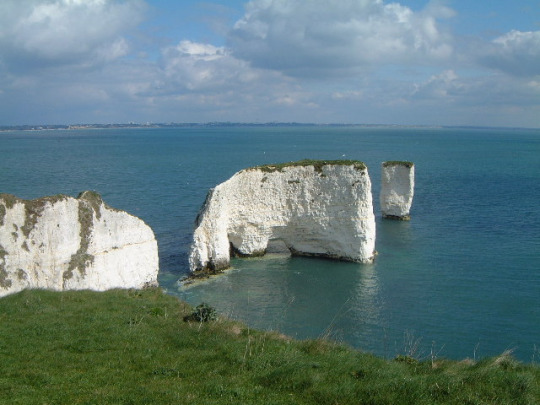
Old Harry Rocks [Image by John Tomlinson, CC BY-SA 2.0]
Tilly whim a famous quarry going down to the bottom of the cliff 1/2 mile or a mile westward from the battery hut, - but not worked now - the whole of the hill (called Crown down) west close above the town full of quarries belonging to different proprietors - went down into one of the deepest quarries, 110 feet deep - stone dragged up a very steep inclined plane on little sledges by a horse turning a windlass - some very deep, bad, muddy slippery steps alongside the incline - went down them thinking this safer than trusting myself on one of the sledges - went by candle light to the end of the shaft the men were working - they were just gone to dinner - could not stand upright - flat indurated rather shiny dark clay roof - could get at no name for this clay but ceiling - very dry - merely a little moisture in one little spot not enough to drop - the bed of stone here about 2 1/2 feet thick - it is thicker in some of the quarries and there one could stand upright no part of this shaft more if so much as 4 feet high - only 1/4 hour going up and down and being in the bottom - bought a largeish specimen of petrified wood the men had brought up from the bottom - glad to have seen this quarry, tho' finely dirtied in scrambling up and down - the stone is a very fine hard conglomerate of shells so broken and compacted by hard pressure? that no one species is distinct? much great quantities of this stone went to London for paving till they got it to such a price that Yorkshire stone was used instead, and now the London market is almost lost for Purbeck stone-
Very comfortable after all at my little Ship Inn - could have staid another day - off at 11 50/.. - wild, stone walled country - up and down not good road - at 1 1/4 stopt at the gate of Corfe Castle 7 miles from Swanage - Corfe a mere village large handsome enough looking church, but had not time to think of seeing it - found a man waiting to walk about the ruins with me, to explain them as he said - it was in an old gateway, now split in 2, and one 1/2 leaning forward (from Cromwell's mining) that Edward the martyr was said to have been assassinated - in the opposite corner of the castle yard and where we now saw some asses feeding was the stable from which according to my guide Edward was said to have been fetching his horse - 1/2 hour among the ruins - very considerable covering the whole top of the hill - the range of hill abutting on each side of it said to be of the same length - that westward not being 100 yards longer than the other -

Corfe Castle [Image by Tallguyuk - Own work, CC BY-SA 3.0]
Asked the guide, a shoemaker, about walking to Lulworth Castle - no carriage road from Corfe - could have a cart - 7 miles - determined to walk and take my man with me - Cameron chose to go - we should have had magnificent sea views had the weather been clear, but too hazy to get more than a peep of the great white fantenil head of the isle of wight, and, could only just distinguish the Xst.chch. [Christchurch] Cliffs and Swanage - ought to have seen all the shipping off Spithead and Xst.chch. [Christchurch] Tower - very fine view of Poole harbour and Brownsea island and the little dots of islands near it, but the town of Poole indistinct - great Orme's head and St. Adlam's race (i.e. St. Aldhelm's head) cross seas there and very dangerous - 1/2 way is Bonn's folly a sort of old gateway that we passed - close to the road and at a distance above Mr. Bonn's house, the Grange, a good looking house, and nice place embossed in wood, at bottom of the valley below us - Mr. Bonn lives by himself said to have no woman to do anything for him but the gardener's wife who cooks and does all - but he has a yatch - not popular, tho' member for corfe? too severe about game, yet willing to screen and help out smugglers -
At 4 1/4 entered Lulworth Castle a square solid mass of building (15 yards square?) between 4 large round towers that seem merely tangents to the 4 corners of the square - a complete basement story projecting 3 or 4 yards all round the castle - good deal of good forest timber about the castle - beautiful peep of the sea thro' a sort a large natural cleft in the cliffs from the dining room windows - large, good house - some handsome rooms furnished at least 1/2 century ago - silk and satin hangings - the duke of Gloucester, Sir Robert Peel, and lastly the French royal family hired the house - the latter much liked - made handsome presents to all the young welds, and gave handsomely over their wages to all employed - very good to the poor - very small scattered village - picturesque little parish protestant church very near the castle - great no. [number] out of every generation religious - priests monks or nuns - 2 of the present Weld's sisters are nuns at Clifton near Bristol -
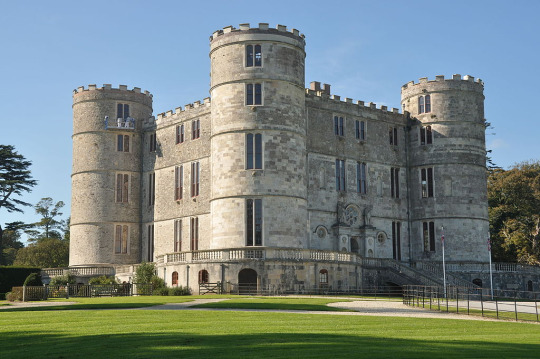
Lulworth Castle after restoration in the 1970s [Image by Nilfanion - Wikimedia UK, CC BY-SA 4.0]
Cameron tired and thirsty stopt a minute or 2 at the little Inn (Weld's arms) to get her some warm ale to drink - myself took a little warm weak vinegar and water and the guide a pint of ale - 1/2 hour seeing the castle - off from the Inn at 5 - and at the Inn at Wareham (6 1/2 miles good) at 6 40/.. - the latter 2 miles on the great high road from W- [Wareham] to Dorchester (distance between them 16 miles) - from Lulworth to the great Dorchester road at 1st over mooreland a moor, then over recently enclosed land - could see nothing the last 2 miles - and nearly ridden over twice by drunken yeomanry cavalry returning from Mr. Bonns where the Miss Bonns had presented them with their colours and made much admired speeches, and given an elegant cold collation - found many of the corps at the Inn here - each to have a glass of grog at the expense of Mr Bonn? and by and by to have a dinner - their cheering and noise most boisterous while I was at tea from 7 to 7 3/4 -
Then wrote pencil travelling notes of today and settled accounts - came to my room at 8 20/.. 8 1/2 - wrote all the above of today till 10 25/.. - and prepared for my cousin perceived him just gently come at Corfe - great deal of rain during last night - rain for about 1/2 hour before arriving at Corfe and for a few mins. [minutes] afterwards then cleared and fair (with the exception of a few heavyish drops 1/2 hour from Lulworth and again on leaving the Inn there) all the rest of the afternoon and evening - as we neared Wareham, the road betokened the recent fall of a good deal of rain - Fahrenheit 68°. now at 10 1/2 p.m. the Wareham church clock is this instant striking 11, and at Swanage I was 1/4 hour too late -
Reference: SH:7/ML/E/14/0123 - SH:7/ML/E/14/0124
#anne lister#anne lister code breaker#gentleman jack#1831#southern england tour#old harry rocks#corfe castle#lulworth castle#swanage
3 notes
·
View notes
Text
Events 5.6 (before 1940)
1527 – Spanish and German troops sack Rome; many scholars consider this the end of the Renaissance. 1536 – The Siege of Cuzco commences, in which Incan forces attempt to retake the city of Cuzco from the Spanish. 1541 – King Henry VIII orders English-language Bibles be placed in every church. In 1539 the Great Bible would be provided for this purpose. 1542 – Francis Xavier reaches Old Goa, the capital of Portuguese India at the time. 1594 – The Dutch city of Coevorden held by the Spanish, falls to a Dutch and English force. 1659 – English Restoration: A faction of the British Army removes Richard Cromwell as Lord Protector of the Commonwealth and reinstalls the Rump Parliament. 1682 – Louis XIV of France moves his court to the Palace of Versailles. 1757 – Battle of Prague: A Prussian army fights an Austrian army in Prague during the Seven Years' War. 1757 – The end of Konbaung–Hanthawaddy War, and the end of Burmese Civil War (1740–1757). 1757 – English poet Christopher Smart is admitted into St Luke's Hospital for Lunatics in London, beginning his six-year confinement to mental asylums. 1782 – Construction begins on the Grand Palace, the royal residence of the King of Siam in Bangkok, at the command of King Buddha Yodfa Chulaloke. 1801 – Captain Thomas Cochrane in the 14-gun HMS Speedy captures the 32-gun Spanish frigate El Gamo. 1835 – James Gordon Bennett, Sr. publishes the first issue of the New York Herald. 1840 – The Penny Black postage stamp becomes valid for use in the United Kingdom of Great Britain and Ireland. 1857 – The East India Company disbands the 34th Regiment of Bengal Native Infantry whose sepoy Mangal Pandey had earlier revolted against the British in the lead up to the War of Indian Independence. 1861 – American Civil War: Arkansas secedes from the Union. 1863 – American Civil War: The Battle of Chancellorsville ends with the defeat of the Army of the Potomac by the Army of Northern Virginia. 1877 – Chief Crazy Horse of the Oglala Lakota surrenders to United States troops in Nebraska. 1882 – Thomas Henry Burke and Lord Frederick Cavendish are stabbed to death by Fenian assassins in Phoenix Park, Dublin. 1882 – The United States Congress passes the Chinese Exclusion Act. 1889 – The Eiffel Tower is officially opened to the public at the Universal Exposition in Paris. 1901 – The first issue of Gorkhapatra, the oldest still running state-owned Nepali newspaper was published. 1906 – The Russian Constitution of 1906 is adopted (on April 23 by the Julian calendar). 1910 – George V becomes King of Great Britain, Ireland, and many overseas territories, on the death of his father, Edward VII. 1915 – Babe Ruth, then a pitcher for the Boston Red Sox, hits his first major league home run. 1915 – Imperial Trans-Antarctic Expedition: The SY Aurora broke loose from its anchorage during a gale, beginning a 312-day ordeal. 1916 – Twenty-one Lebanese nationalists are executed in Martyrs' Square, Beirut by Djemal Pasha. 1916 – Vietnamese Emperor Duy Tân is captured while calling upon the people to rise up against the French, and is later deposed and exiled to Réunion island. 1933 – The Deutsche Studentenschaft attacked Magnus Hirschfeld's Institut für Sexualwissenschaft, later burning many of its books. 1935 – New Deal: Under the authority of the newly-enacted Federal Emergency Relief Administration, President Franklin D. Roosevelt issues Executive Order 7034 to create the Works Progress Administration. 1937 – Hindenburg disaster: The German zeppelin Hindenburg catches fire and is destroyed within a minute while attempting to dock at Lakehurst, New Jersey. Thirty-six people are killed.
1 note
·
View note
Photo


18th March 978 - The murder of King Edward (The Martyr) at Corfe Castle, Dorset.
Edward was the eldest son of King Edgar the Peaceful. Edward the Martyr’s birth date is not known for sure but, it is thought he was thirteen years old when his father King Edward died in 975. Edward had a younger half-brother, Ethelred the Unready. Ethelred was the son of King Edgar’s third wife, Queen Elfthryth
Due to questions about Edward’s legitimacy, following the death of his father in 975 there were disputes about who was the rightful heir to the throne. Edward was chosen as king and was crowned by his main clerical supporters, the Archbishops Dunstan of Canterbury and Oswald of York.
On the fateful day teenager King Edward rode to Corfe Castle to visit his step-mother Queen Dowager Elfthryth and half-brother Ethelred. The story goes that he was met outside the castle by Elfthryth’s courtiers and offered a drink of mead. Edward, still mounted was then stabbed mercilessly. His horse bolted and the young king’s body was dragged for several miles into the darkness. It is thought but, not proved that Queen Elfthryth plotted the assassination so that her own son Ethelred would inherit the throne.
Edward was buried at nearby Wareham without pomp and ceremony. A year later his miraculously preserved body was disinterred and buried with full Royal honours at Shaftesbury Abbey. In the year 1001, following his recognition as a Saint, Edwards relics were moved to a more prominent position in the abbey.
In the 16th Century during the reign of Henry VIII, Edward’s remains were hidden to avoid desecration. They were not found again until 1931. After being kept for a number of years in the vault at a branch of Midland Bank in Surrey, King Edward’s remains are now buried at the Orthodox Church of St Edward the Martyr in Brookwood, Surrey
39 notes
·
View notes
Note
I would like to request the #11, the 'thank god you're alive'-kiss. With Batman and Riddler if possible.
„We have twenty-five minutes to get out of this cell, sneak into the laboratory and secure the virus, then hijack a helicopter and return to Gotham before the League starts their operation.” Batman paused and pulled at his restraints, his wrists and ankles were firmly held by the hard and unforgiving metal. “We know that Ra’s did not give the order yet, we still have time so… Are you listening, Edward?”The uncharacteristically silent figure leaning against the opposite wall didn’t give any sign of life. Batman, however, still had his cowl and the readings of his scanner were showing Riddler’s slow and steady heartbeat – perhaps too calm for the given situation?“Your wound is not that serious. You’re gonna live – if we manage to escape, that is.”“Easy for you to say,” the hiss that escaped the man was reminding Bruce of an angry Catwoman. “It’s not you who got the sword through the foot, you overrated, unreliable, martyr-wannabe!”Bruce noticed the sudden change in the readings and assured himself that Edward was just fine. If he had a hand free, he’d switch the detective-mode off. He hadn’t.“You know that you got that sword to your foot only because you don’t know when to keep your mouth shut, right?”The Riddler didn’t care to reply, he turned his head away not to look in Batman’s direction, even more ostentatiously than before.“But your injury actually plays into our hands,” Bruce continued, brushing off the obvious display of being theatrically ignored by the sulking man-child, “since the assassins have thought you would be unable to walk, they didn’t bother to cuff your legs or chain you to the wall. So, get over here and help me get my hands free.”“Don’t boss me around, I’m not one of your sidekicks!”“It’s for your own good,” Batman tried not to let out an irritated sigh. “We have twenty-five, no, twenty-four minutes before…”“Don’t pretend to CARE for ‘my own good’, you cheater!”The bitterness of those words struck him like a knife, Bruce was glad he didn’t have to look into Edward’s eyes at this moment but the readings of the Riddler’s unhealthily increased pulse rate told him more than he wanted to know.“I’ve heard what you said to that sleazy al Ghul-girl. You wished I’d rather be dead from brain cancer than messing with her daddy’s precious Lazarus Pit!”“Edward…”“Don’t!” He cut Bruce off again, and this time it sounded more pitiful than angry. Bruce didn’t intend to listen.“I’ve never wished for you, for anyone, to fall ill.”“But you didn’t help! And you thought, I would just do nothing? Lay down and die? Because that’d save your beloved city from Ra’s’ wrath, now wouldn’t it?”The ice-cold silence between the stone walls of their cell left Batman with a heavy heart. He knew he should say something, staying quiet like that meant admitting his guilt, and yet he had no words for Edward. No words except…“I’m sorry…”They stared at each other for far too long, Bruce seeing nothing but Riddler’s skeletal system – skeletal system and the heartbeat readings that were getting less rapid with every passing moment.And just like in a slow-motion picture, Edward stood up, limped forward, got himself so very close to Bruce’s tied-up body.“Are you?” He whispered, his hot breath tickled the skin on Batman’s jaw.Bruce couldn’t help but lean toward that heat, his lips brushing over Edward’s cheek.The man shuddered a bit but stayed there and let those dry lips travel over his freckled skin to finally meet his mouth.Slowly, Bruce tasted him. There was a hint of salt and copper, and something more, something strangely familiar – like a long-forgotten longing that they both carried with them. He closed his eyes, kissing softly, allowing himself to dive deep into the feeling.When they parted, tired and overwhelmed by so much affection, then it came – this awkward moment in which the logical part of the brain started to kick in. Before Edward could sober up and move away, Bruce wanted to tell him how glad he was – glad for Edward to be alive.He didn’t. There were only twenty minutes left and Gotham needed to be saved – again.
#batman#batman fanfiction#fanfiction#bruce wayne#edward nygma#riddler#riddlebat#kiss#my story#temarcia#bat-mania
18 notes
·
View notes